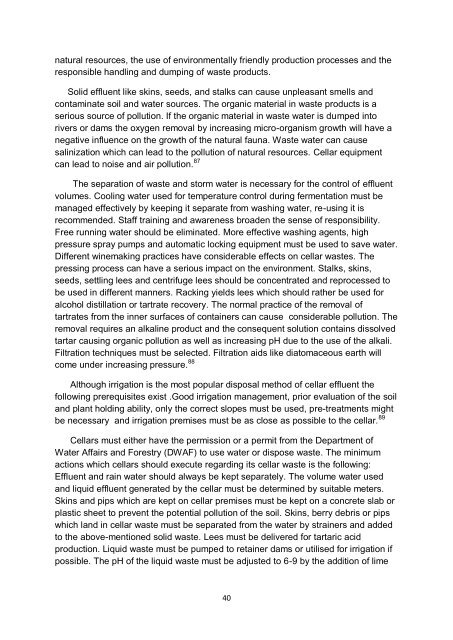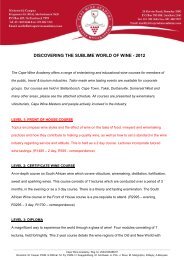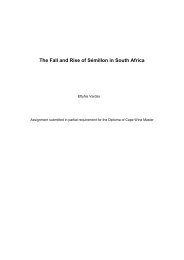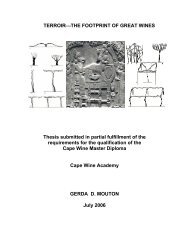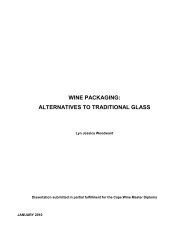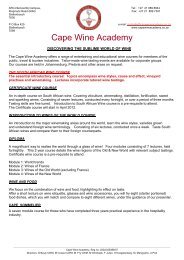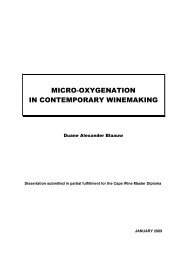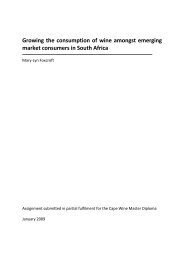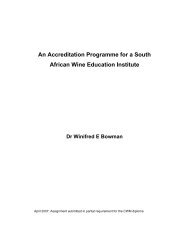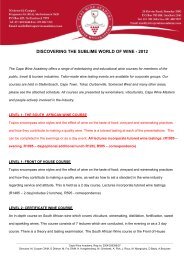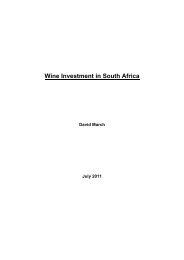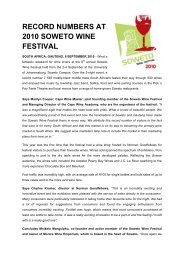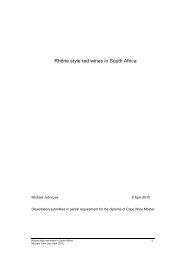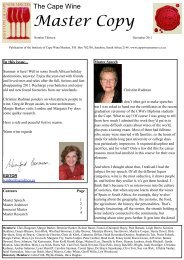Garage Winemaking in South Africa Less is More - Cape Wine ...
Garage Winemaking in South Africa Less is More - Cape Wine ...
Garage Winemaking in South Africa Less is More - Cape Wine ...
You also want an ePaper? Increase the reach of your titles
YUMPU automatically turns print PDFs into web optimized ePapers that Google loves.
natural resources, the use of environmentally friendly production processes and the<br />
responsible handl<strong>in</strong>g and dump<strong>in</strong>g of waste products.<br />
Solid effluent like sk<strong>in</strong>s, seeds, and stalks can cause unpleasant smells and<br />
contam<strong>in</strong>ate soil and water sources. The organic material <strong>in</strong> waste products <strong>is</strong> a<br />
serious source of pollution. If the organic material <strong>in</strong> waste water <strong>is</strong> dumped <strong>in</strong>to<br />
rivers or dams the oxygen removal by <strong>in</strong>creas<strong>in</strong>g micro-organ<strong>is</strong>m growth will have a<br />
negative <strong>in</strong>fluence on the growth of the natural fauna. Waste water can cause<br />
sal<strong>in</strong>ization which can lead to the pollution of natural resources. Cellar equipment<br />
can lead to no<strong>is</strong>e and air pollution. 87<br />
The separation of waste and storm water <strong>is</strong> necessary for the control of effluent<br />
volumes. Cool<strong>in</strong>g water used for temperature control dur<strong>in</strong>g fermentation must be<br />
managed effectively by keep<strong>in</strong>g it separate from wash<strong>in</strong>g water, re-us<strong>in</strong>g it <strong>is</strong><br />
recommended. Staff tra<strong>in</strong><strong>in</strong>g and awareness broaden the sense of responsibility.<br />
Free runn<strong>in</strong>g water should be elim<strong>in</strong>ated. <strong>More</strong> effective wash<strong>in</strong>g agents, high<br />
pressure spray pumps and automatic lock<strong>in</strong>g equipment must be used to save water.<br />
Different w<strong>in</strong>emak<strong>in</strong>g practices have considerable effects on cellar wastes. The<br />
press<strong>in</strong>g process can have a serious impact on the environment. Stalks, sk<strong>in</strong>s,<br />
seeds, settl<strong>in</strong>g lees and centrifuge lees should be concentrated and reprocessed to<br />
be used <strong>in</strong> different manners. Rack<strong>in</strong>g yields lees which should rather be used for<br />
alcohol d<strong>is</strong>tillation or tartrate recovery. The normal practice of the removal of<br />
tartrates from the <strong>in</strong>ner surfaces of conta<strong>in</strong>ers can cause considerable pollution. The<br />
removal requires an alkal<strong>in</strong>e product and the consequent solution conta<strong>in</strong>s d<strong>is</strong>solved<br />
tartar caus<strong>in</strong>g organic pollution as well as <strong>in</strong>creas<strong>in</strong>g pH due to the use of the alkali.<br />
Filtration techniques must be selected. Filtration aids like diatomaceous earth will<br />
come under <strong>in</strong>creas<strong>in</strong>g pressure. 88<br />
Although irrigation <strong>is</strong> the most popular d<strong>is</strong>posal method of cellar effluent the<br />
follow<strong>in</strong>g prerequ<strong>is</strong>ites ex<strong>is</strong>t .Good irrigation management, prior evaluation of the soil<br />
and plant hold<strong>in</strong>g ability, only the correct slopes must be used, pre-treatments might<br />
be necessary and irrigation prem<strong>is</strong>es must be as close as possible to the cellar. 89<br />
Cellars must either have the perm<strong>is</strong>sion or a permit from the Department of<br />
Water Affairs and Forestry (DWAF) to use water or d<strong>is</strong>pose waste. The m<strong>in</strong>imum<br />
actions which cellars should execute regard<strong>in</strong>g its cellar waste <strong>is</strong> the follow<strong>in</strong>g:<br />
Effluent and ra<strong>in</strong> water should always be kept separately. The volume water used<br />
and liquid effluent generated by the cellar must be determ<strong>in</strong>ed by suitable meters.<br />
Sk<strong>in</strong>s and pips which are kept on cellar prem<strong>is</strong>es must be kept on a concrete slab or<br />
plastic sheet to prevent the potential pollution of the soil. Sk<strong>in</strong>s, berry debr<strong>is</strong> or pips<br />
which land <strong>in</strong> cellar waste must be separated from the water by stra<strong>in</strong>ers and added<br />
to the above-mentioned solid waste. Lees must be delivered for tartaric acid<br />
production. Liquid waste must be pumped to reta<strong>in</strong>er dams or util<strong>is</strong>ed for irrigation if<br />
possible. The pH of the liquid waste must be adjusted to 6-9 by the addition of lime<br />
40


